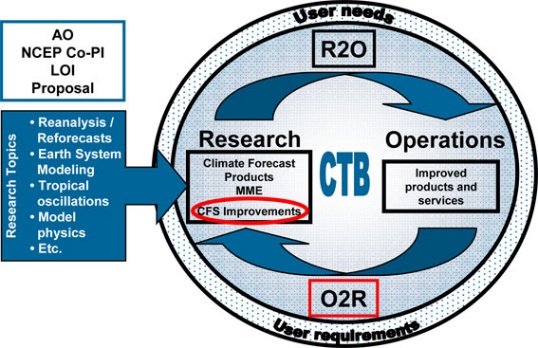 NOAA/National Centers for Environmental Prediction (NCEP) is the lead agency with responsibility for producing US operational climate monitoring, models and predictions on time scales ranging from weeks to years. The mission of NOAA Climate Test Bed (CTB) is to accelerate research-to-operation (R2O) to improve NCEP operational climate models, monitoring and predictions, and to provide operations-to-research (O2R) support to the climate research community with access to operational models, forecast tools and datasets.
NOAA/National Centers for Environmental Prediction (NCEP) is the lead agency with responsibility for producing US operational climate monitoring, models and predictions on time scales ranging from weeks to years. The mission of NOAA Climate Test Bed (CTB) is to accelerate research-to-operation (R2O) to improve NCEP operational climate models, monitoring and predictions, and to provide operations-to-research (O2R) support to the climate research community with access to operational models, forecast tools and datasets.
The CTB facility is located at NCEP Climate Prediction Center (CPC) in the NOAA Center for Weather and Climate Prediction in College Park, MD. The NOAA CTB is jointly supported by NCEP, Climate Program Office (CPO) and NWS Office of Science and Technology Integration (OSTI). CPO’s Modeling, Analysis, Predictions, and Projections (MAPP) program sponsors CTB transition projects through competitive grants, NCEP provides infrastructure support for CTB’s testing and demonstration projects in an operational environment and NWS/OSTI provides scientific coordination and programmatic support.
The CTB’s current priorities include i) multi-model ensembles for climate predictions, ii) Climate Forecast System (CFS) improvements, iii) climate forecast tools and products; and iv) climate-quality reanalysis.
 The second version of the NCEP Climate Forecast System (CFSv2) was made operational at NCEP in March 2011. This version has upgrades to nearly all aspects of the data assimilation and forecast model components of the system. A coupled reanalysis was made over a 32-yr period (1979–2010), which provided the initial conditions to carry out a comprehensive reforecast over 29 years (1982–2010). This was done to obtain consistent and stable calibration, as well as skill estimates for the operational subseasonal and seasonal predictions at NCEP with CFSv2. The operational implementation of the full system ensures a continuity of the climate record and provides a valuable up-to-date dataset to study many aspects of predictability on the seasonal and subseasonal scales. Evaluation of the reforecasts show that the CFSv2 increases the length of skillful MJO forecasts from 6 to 17 days (dramatically improving subseasonal forecasts), nearly doubles the skill of seasonal forecasts of 2m temperatures over the United States, and significantly improves global Sea Surface Temperatures (SST) forecasts over its predecessor. The CFSv2 not only provides greatly improved guidance at these time scales but also creates many more products for subseasonal and seasonal forecasting with an extensive set of retrospective forecasts for users to calibrate their forecast products. These retrospective and real-time operational forecasts are used by a wide community of decision makers in areas such as water management for rivers and agriculture, transportation, energy use by utilities, wind and other sustainable energy, and seasonal prediction of the hurricane season. Source: https://journals.ametsoc.org/doi/abs/10.1175/JCLI-D-12-00823.1
The second version of the NCEP Climate Forecast System (CFSv2) was made operational at NCEP in March 2011. This version has upgrades to nearly all aspects of the data assimilation and forecast model components of the system. A coupled reanalysis was made over a 32-yr period (1979–2010), which provided the initial conditions to carry out a comprehensive reforecast over 29 years (1982–2010). This was done to obtain consistent and stable calibration, as well as skill estimates for the operational subseasonal and seasonal predictions at NCEP with CFSv2. The operational implementation of the full system ensures a continuity of the climate record and provides a valuable up-to-date dataset to study many aspects of predictability on the seasonal and subseasonal scales. Evaluation of the reforecasts show that the CFSv2 increases the length of skillful MJO forecasts from 6 to 17 days (dramatically improving subseasonal forecasts), nearly doubles the skill of seasonal forecasts of 2m temperatures over the United States, and significantly improves global Sea Surface Temperatures (SST) forecasts over its predecessor. The CFSv2 not only provides greatly improved guidance at these time scales but also creates many more products for subseasonal and seasonal forecasting with an extensive set of retrospective forecasts for users to calibrate their forecast products. These retrospective and real-time operational forecasts are used by a wide community of decision makers in areas such as water management for rivers and agriculture, transportation, energy use by utilities, wind and other sustainable energy, and seasonal prediction of the hurricane season. Source: https://journals.ametsoc.org/doi/abs/10.1175/JCLI-D-12-00823.1
The NCA is the official US Government’s “State of the Union” about climate change, vetted by 13
Federal agencies, that
See Information note here
The IPCC is a scientific intergovernmental body set up by the World Meteorological Organization (WMO) and by the United Nations Environment Programme (UNEP). It was established to provide decision-makers and others with an objective source of information about climate change. The IPCC does not conduct any research nor does it monitor climate related data or parameters. Its role is to assess on a comprehensive, objective, open, and transparent basis the latest scientific, technical, and socio-economic literature produced worldwide relevant to the understanding of the risk of human-induced climate change, its observed and projected impacts, and options for adaptation and mitigation.
More details on the IPPC can be found at: http://www.ipcc.ch/